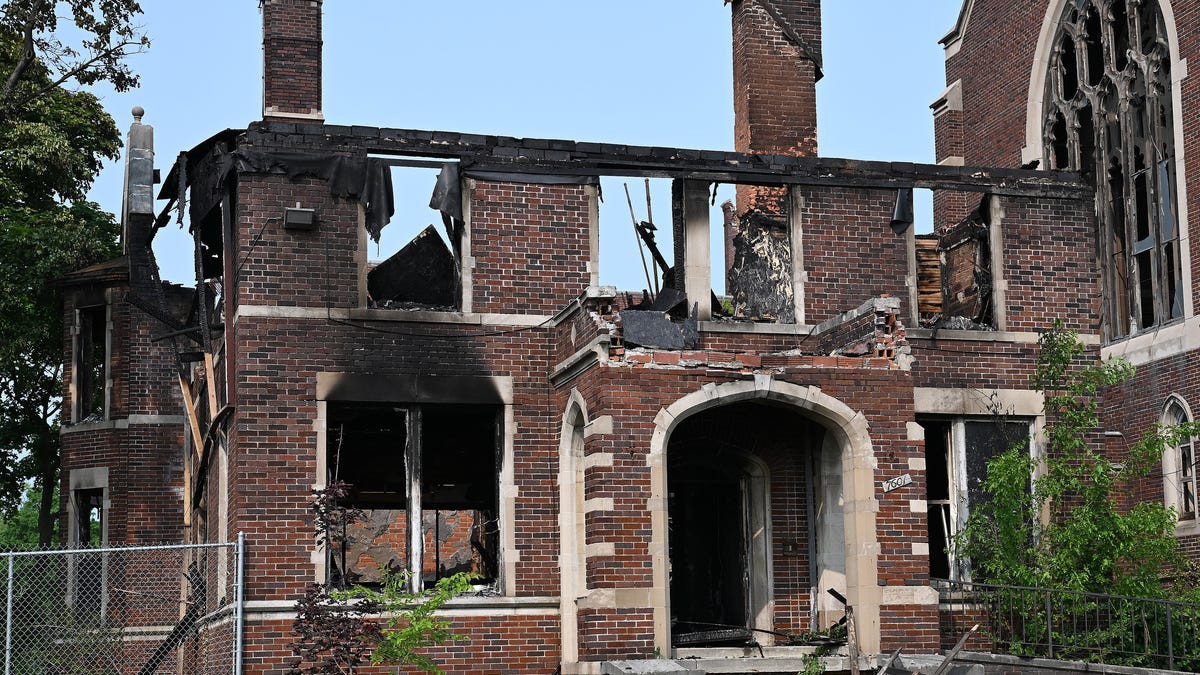New York
His Mind Helped Rebuild New York. His Body Is Failing Him.

The man pulls the buttoned blue shirt down over his head and waits. His hands, bony, cratered, have lost their strength, so the shirt flutters open at the sleeves and neck. His wife walks into the bedroom. She takes his left hand in hers, and closes the button around his wrist.
“I did succeed in shaving this morning,” says the man.
“Without cutting yourself?” says his wife.
“Without cutting myself.”
The man built so much of this city. Look around. The World Trade Center, rebuilt from a mangled hole in the ground? He led that. The High Line and Hudson Yards? He led those, too. Barclays Center, Citi Field and the new Yankees Stadium? Parks on Governors Island and the Brooklyn waterfront? The East River skyline from Williamsburg to Long Island City? Him, him, him.
Once, and it wasn’t so long ago, Dan Doctoroff had more power to decide what got built in New York City than anyone since Robert Moses. Now he is diagnosed with A.L.S., a neurodegenerative disease also known as Lou Gehrig’s that attacks the motor neurons in the brain and spinal cord, causing patients to lose control of their voluntary muscles. A.L.S. turns the body into a prison. Only the eyes and brain remain mostly unaffected. Death comes by lung failure and suffocation, usually within three to five years of diagnosis.
Mr. Doctoroff is 65. He was diagnosed almost two years ago.
As a powerful man loses authority over his own body, how does he change? And what remains?
It is winter, 2005,
and Mr. Doctoroff is thinking ahead, to a summer day seven years in the future. He is deputy mayor of New York, charged with rebuilding the city after 9/11. His job is to dream the future, and then to marshal the city’s gargantuan bureaucracy to get those dreams built. His boss, Mayor Michael Bloomberg, has even compared Mr. Doctoroff to Mr. Moses: both master builders, both at once respected and resented for their relentlessness and their impatience.
But even Mr. Moses never tried to bring the Olympics to New York.
Mr. Doctoroff visits corporate suites, hotel conference rooms and newspaper editorial boards to give his pitch. In his mind, the 2012 Olympics are already about to start. Ferries cross the East River in a parade. The boats carry athletes to a gleaming Olympic Village, built in Queens atop the ruins of empty warehouses and falling-down piers.
Come, he says. Dream with me.
How many times has Mr. Doctoroff given this spiel? A hundred? As he repeats it, he worries. He feels trapped between his imagined future and the onrushing now. His mind jumps again, to the six emergencies erupting across his desk. He feels pulled in so many directions, it’s hard to be present with people. Do they notice?
He’s right to worry. People notice. A journalist who hears the Olympics pitch describes Mr. Doctoroff as a man whose eyes “gaze past you, out towards the horizon.”
Why this constant drive? Why does he find it so difficult to be present? For years, he doesn’t know. His brother Andy says Mr. Doctoroff should be more introspective, and who knows. Maybe Andy is right. Mr. Doctoroff is aware that he graduated Harvard aimless and lazy. Wound up in New York by following his wife, Alisa, who got a job in town. Bluffed his way into a job on Wall Street. Discovered he enjoys spinning numbers into stories, stories with grand ambitions, like a highly leveraged company with hidden potential, or why New York must host the Olympics.
“You could tell he’s very bright, and very competitive,” recalls Stephen Ross, founder and chairman of the real estate development firm Related Companies, who heard the pitch, dropped his own Olympic bid and joined Mr. Doctoroff’s team.
It is hard work seeing the future, and so Mr. Doctoroff puts everything into the job. But peering into the future makes it hard to see the present — hard to be home with his wife and children, hard to really see them. He leaves his townhouse on the Upper West Side each morning in darkness. He rides his bike down the Hudson River trail. He arrives at City Hall before sunrise, even in summer. He starts dozens of development projects, from the Bronx to Staten Island. He flies around the world, advancing the Olympics bid. He runs on discipline and work and depths of ambition that seem — even to his very successful friends — a little freakish.
His staff, mostly Ivy League types 20 years his junior, try to keep up. They fail.
“‘Don’t tell me no. I don’t believe in no,’” Sharon Greenberger, Mr. Doctoroff’s first chief of staff in city government, says of his worldview back then. “Barriers are temporary. And we just keep going.”
At city hall, no project goes smoothly. Each elicits an angry petition, a news conference, a lawsuit from neighbors or a state senator. Assembly Speaker Sheldon Silver kills Mr. Doctoroff’s plan for a stadium on the west side of Manhattan, and with it the entire Olympics bid. Governor George Pataki and leaders at the Port Authority rebuild the World Trade Center with office towers, overruling Mr. Doctoroff’s push for a mixed-use neighborhood of apartments and restaurants. Apartment towers and a basketball arena rise in Downtown Brooklyn, but local residents and the 2008 recession force developers to abandon Mr. Doctoroff’s larger plan for 17 high-rises, many up to 50 stories tall.
Mr. Doctoroff’s impatience grows. Ms. Greenberger invents the Doctoroff Mood-o-Meter, advising staff whether to approach or hide. Mr. Doctoroff’s tantrums cause Mr. Bloomberg so much joy, the mayor stops working, eats popcorn and watches.
“Dan’s team at City Hall was very familiar with his impatience and demanding style,” Mr. Bloomberg says of those days in an email, “but they would have run through a brick wall for him.”
Opponents accuse Mr. Doctoroff of “unmitigated arrogance,” according to an editorial in The New York Post. So do allies, including Senator Chuck Schumer.
“He was a bulldozer,” Daniel Goldstein, the leader of a group of neighbors fighting Mr. Doctoroff’s plans for Downtown Brooklyn, tells The Village Voice.
“I just think I was a little out of control,” Mr. Doctoroff says. “I was jet-lagged constantly, probably in a bad mood, which is why sometimes I would yell at people. Which I regret.”
Only Mr. Doctoroff’s closest aides know his mother is fighting cancer. Then his father is diagnosed with A.L.S. Every three weeks for eight years, Mr. Doctoroff travels to his hometown near Detroit, first to care for his mother, then for his father. Both parents die. His uncle dies, also from A.L.S. Mr. Doctoroff creates a nonprofit called Target ALS, raises tens of millions of dollars for A.L.S. research.
It is 2017,
and Mr. Doctoroff looks down from his office on the 27th floor of a tower in Hudson Yards, a neighborhood he named. He sees the glass-capped entrance to the 7-train station, New York’s first subway line extension in decades.
He is now the chief executive of Sidewalk Labs, a start-up Mr. Doctoroff founded with Google after running Bloomberg L.P. for six years.
“Just as we hoped, Midtown leapt to the west and West Chelsea burst to the north, creating a new neighborhood in Manhattan’s last frontier,” Mr. Doctoroff writes in his autobiography.
His schedule slows a little. Mr. Doctoroff finds a therapist to figure out how to spend his extra time. He digs into his childhood in Birmingham, Mich. His father, Myles, drove a blue Chevrolet station wagon to work at a no-name law firm. His mother scolded her husband. Why can’t you be more ambitious?
He remembers his mother’s anger, her need for prestige. He watched his father rise to become chief judge of the Michigan Court of Appeals.
“I didn’t want to disappoint my mom,” Mr. Doctoroff says. “That has been the major motivating force in my career. And I didn’t even know it.”
Years later, he and Alisa vacation in Iceland. He walks up a hill and loses his breath — strange, he thinks. Back in New York, in October 2021, a doctor offers a diagnosis: The same disease that killed Mr. Doctoroff’s father and uncle; the same disease he had already raised millions to fight.
Mr. Doctoroff had always tried to predict the future, and sometimes it seemed like he could. But that was just his hopes underpinned by his confidence. Now he can see the future with a measure of certainty, and it is finite and hard: This is how he will die.
He calls Manish Raisinghani, the chief executive of Target ALS. He delivers the news, and an order.
“He said, ‘I want to grow this organization. Don’t think small. Think really big. And let’s move really quickly,’” Mr. Raisinghani recalls. “I’m stunned. But he’s not missing a beat.”
Mr. Doctoroff decides to fund partnerships between scientists, biotech companies and venture capitalists during the earliest stages of research. Hopefully this will encourage drug companies to weather the expensive and risky process of seeking approval from the Food and Drug Administration.
He figures he needs $250 million. A year and a half later, he has only $22 million to go.
“They’re going to have a ton of money,” Jeff Rothstein, a former Target ALS board member who directs the Brain Science Institute at Johns Hopkins University, says of its current trajectory.
Mr. Doctoroff’s body fades quickly. He wakes one morning to find his abdominal muscles have disappeared in the night. His whole life, people described him as athletic and good-looking. He enjoyed that. Now his belly falls over his belt like a basketball. He jokes that this is the worst part of A.L.S. He lands the joke by setting his eyebrows to show it is not entirely a joke.
The disease attacks his lungs. Breath comes raggedly, turning his powerful voice into a soft, pausing tremolo. Central Park stands across the street from his house. The nearest train station is three blocks away. Both too far, now that he loses breath on a short flight of stairs.
“There is some upside to having A.L.S.,” he says. “I don’t have to walk the dogs.”
Adapt. Optimize. Take a complex situation and make it better. The disease will have his body. It will not claim his optimism. Can’t ride the subway? Buy a Vespa. Can’t walk without losing breath? Buy hiking sticks, use them to squeeze air into the lungs. A black brace over his right calf prevents Mr. Doctoroff’s foot from dropping as he walks. Black pants prevent people from noticing.
“I’m right-handed, but now I eat with my left hand. I’m getting good at it!” he says. “I find, actually, adaptation is fun. There’s got to be a better way. I can do it. I can look at it as a positive thing instead of a negative.”
It is May 7, 2023,
and Mr. Doctoroff sees 600 scientists, investors and drug company executives in a hotel conference room in Boston for the annual meeting of Target ALS. They discuss the first drug ever to reverse symptoms of the disease.
“We’re in a new era for A.L.S. research,” Mr. Doctoroff says.
He no longer tries to see the future. He is here, present, and it’s simple. With A.L.S., there’s no time to worry about time. He flies to Puerto Rico, Knoxville, Detroit and Provence with family or friends from high school. He rides his Vespa to meet his rich friends. He delivers his Target ALS pitch, wins a handshake and a promise for $200,000 or a million. He’s still on the board at Bloomberg Philanthropies and the University of Chicago, still gets dragooned into helping the mayor and the governor plan New York’s future. For a normal person, this is a busy career in full bloom.
For Mr. Doctoroff, it is retirement. His dread is replaced by a calm that surprises him.
“You worked so hard when we were growing up,” Ariel Doctoroff says to her father. “We talked about how you were never around, basically. Except for on Saturdays.”
“That’s not true,” Mr. Doctoroff says.
“I know. It’s not true,” Ariel says. “And you tried extremely hard to be present.”
Now, at last, he is.
“I never enjoyed any achievement or anything we accomplished because I was always on to the next thing,” he says. “I’ve changed dramatically since my diagnosis. It’s funny. I just don’t think about the future much. And that has made me more patient. It has made me, I think, a nicer person.”
His voice grows weaker. His peace grows stronger. His will remains. It is 8:30 in the morning on a Tuesday in August. The man places both palms on the windowsill of his home gym. He groans, and allows his knees to drop to the floor. A tangle of ropes and rubber bands hangs from hooks on the nearest wall. A physical trainer, connected by Zoom, instructs Mr. Doctoroff to grab the thinnest, lightest band.
“I can do the heavy one,” Mr. Doctoroff says.
“You sure?” says the trainer.
“Yeah.”

New York
Are You Smarter Than a Billionaire?

Over the course of one week, some of the richest people in the world descended on New York’s auction houses to purchase over $1 billion of art. It might have played out a little differently than you would have expected.
Can you guess which of these works sold for more?
Note: Listed sale prices include auction fees.
Image credits: “Untitled,” via Phillips; “Baby Boom,” via Christie’s Images LTD; “Hazy Sun,” With permission of the Renate, Hans & Maria Hofmann Trust/Artists Rights Society (ARS), New York; via Christie’s Images LTD; “Petit Matin,” via Christie’s Images LTD; “Concetto spaziale, La fine di Dio,” Artists Rights Society (ARS), New York/SIAE, Rome; via Sotheby’s; “Baroque Egg with Bow (Orange/Magenta),” via Sotheby’s; “The Last Supper,” The Andy Warhol Foundation for the Visual Arts, Inc./Licensed by Artists Rights Society (ARS), New York; via Christie’s Images LTD; “Campbell’s Soup I,” The Andy Warhol Foundation for the Visual Arts, Inc./Licensed by Artists Rights Society (ARS), New York; via Christie’s Images LTD; “Miss January,” via Christie’s Images LTD; “Fingermalerei – Akt,” via Sotheby’s; “Grande tête mince (Grande tête de Diego),” Succession Alberto Giacometti/Artists Rights Society (ARS), NY; via Sotheby’s; “Tête au long cou,” Succession Alberto Giacometti/ARS, NY/Photos: ADAGP Images/Paris 2025; via Christie’s Images LTD; “Revelacion,” Remedios Varo, Artists Rights Society (ARS), New York / VEGAP, Madrid; via Christie’s Images LTD; “Le jardin nocturne,” Foundation Paul Delvaux, Sint-Idesbald – ARS/SABAM Belgium; via Christie’s Images LTD.
Produced by Daniel Simmons-Ritchie.
New York
Video: How a Mexican Navy Ship Crashed Into the Brooklyn Bridge

On Saturday, a Mexican Navy ship on a good will tour left a New York City pier bound for Iceland. Four minutes later, it crashed into the Brooklyn Bridge. [Spanish] “It’s falling!” [English] “No way!” Here’s what happened. The Cuauhtémoc had been docked on the Lower East Side of Manhattan for four days, open to visitors looking for a cultural experience. As the ship prepared to leave on Saturday night, a tugboat arrived to escort it out of its pier at 8:20 p.m. The ship’s bow, the front of the vessel, faced Manhattan, meaning it would need to back out of its berth into the East River. As the Cuauhtémoc pulled away from shore, the tugboat appeared to push the side of the ship, helping to pivot the bow south toward its intended route. The river was flowing northeast toward the Brooklyn Bridge and the wind was blowing in roughly the same direction, potentially pushing the ship toward a collision. Photos and videos suggest the tugboat was not tied to the ship, limiting its ability to pull the ship away from the bridge. The Cuauhtémoc began to drift north, back first, up the river. Dr. Salvatore Mercogliano, who’s an adjunct professor at the U.S. Merchant Marine Academy, told The Times that the ship appeared to be giving off a wake. This suggests its propellers may have been running in reverse, pushing it faster toward the bridge. The tugboat sped alongside the ship as it headed north, possibly trying to get in front of it and help the ship maneuver the other way. But it was unable to cut the ship off or reverse its course. All three masts crashed into the underside of the Brooklyn Bridge at approximately 8:24 p.m., four minutes after the ship had left the pier, causing the top sails to collapse. Crew members standing on the masts during the collision were thrown off entirely. Others remained hanging from their harnesses. A New York City patrol boat arrived about eight minutes after the collision, followed quickly by a fire department boat. Additional law enforcement and emergency medical services removed the wounded for treatment. According to the Mexican Navy, two of the 227 people aboard the ship were killed and 22 others were injured.
New York
Audio Data Shows Newark Outage Problems Persisted Longer Than Officials Said

On April 28, controllers at a Philadelphia facility managing air traffic for Newark Liberty International Airport and smaller regional airports in New Jersey suddenly lost radar and radio contact with planes in one of the busiest airspaces in the country.
On Monday, two weeks after the episode, Sean Duffy, the secretary of transportation, said that the radio returned “almost immediately,” while the radar took up to 90 seconds before it was operational.
A Times analysis of flight traffic data and air traffic control feed, however, reveals that controllers were struggling with communication issues for several minutes after transmissions first blacked out.
The episode resulted in multiple air traffic controllers requesting trauma leave, triggering severe flight delays at Newark that have continued for more than two weeks.
Several exchanges between pilots and controllers show how the outage played out.
Outage Begins
Air traffic recordings show that controllers at the Philadelphia facility first lost radio and radar communications for about a minute starting just before 1:27 p.m., after a controller called out to United Flight 1951, inbound from Phoenix.
The pilot of United 1951 replied to the controller’s call, but there was no answer for over a minute.
1:26:41 PM
Controller
OK, United 1951.
1:26:45 PM
Pilot
Go ahead.
1:27:18 PM
Pilot
Do you hear us?
1:27:51 PM
Controller
How do you hear me?
1:27:53 PM
Pilot
I got you loud and clear now.
Two other planes reached out during the same period as United 1951 — a Boeing 777 inbound from Austria and headed to Newark, and a plane whose pilot called out to a controller, “Approach, are you there?” Their calls went unanswered as well.
Radio Resumes, With Unreliable Radar
From 1:27 to 1:28 p.m., radio communications between pilots and controllers resumed. But soon after, a controller was heard telling multiple aircraft about an ongoing radar outage that was preventing controllers from seeing aircraft on their radarscopes.
One of the planes affected by the radar issues was United Flight 674, a commercial passenger jet headed from Charleston to Newark.
1:27:32 PM
Pilot
United 674, approach.
1:27:36 PM
Controller
Radar contact lost, we lost our radar.
1:30:34 PM
Controller
Turn left 30 degrees.
1:31:03 PM
Pilot
All right, we’re on a heading of 356. …
1:31:44 PM
Controller
I see the turn. I think our radar might be a couple seconds behind.
Once the radio started operating again, some controllers switched from directing flights along their planned paths to instead providing contingency flight instructions.
At 1:28 p.m., the pilot of Flight N16NF, a high-end private jet, was called by a controller who said, “radar contact lost.” The pilot was then told to contact a different controller on another radio frequency.
About two and a half minutes later, the new controller, whose radar did appear to be functioning, instructed the pilot to steer towards a location that would be clear of other aircraft in case the radio communications dropped again.
Flight N426CB, a small private jet flying from Florida to New Jersey, was told to call a different radio frequency at Essex County Airport, known as Caldwell Airport, in northern New Jersey for navigational aid. That was in case the controllers in Philadelphia lost radio communications again.
1:27:57 PM
Controller
If for whatever reason, you don’t hear anything from me further, you can expect to enter right downwind and call Caldwell Tower.
1:29:19 PM
Controller
You just continue on towards the field. They’re going to help navigate you in.
This is in case we are losing our frequencies.
1:29:32 PM
Pilot
OK, I’m going over to Caldwell. Talk to you. Have a good afternoon.
Minutes Later, Radar Issues Persist
According to the Federal Aviation Administration, aircraft reappeared on radarscopes within 90 seconds of the outage’s start, but analysis of air traffic control recordings suggest that the radar remained unreliable for at least some radio frequencies for several minutes after the outage began around 1:27 p.m.
At 1:32 p.m., six minutes after the radio went quiet, Flight N824TP, a small private plane, contacted the controller to request clearance to enter “Class B” airspace — the type around the busiest airports in the country. The request was denied, and the pilot was asked to contact a different radio frequency.
1:32:43 PM
Pilot
Do I have Bravo clearance?
1:32:48 PM
Controller
You do not have a Bravo clearance. We lost our radar, and it’s not working correctly. …
If you want a Bravo clearance, you can just call the tower when you get closer.
1:32:59 PM
Pilot
I’ll wait for that frequency from you, OK?
1:33:03 PM
Controller
Look up the tower frequencies, and we don’t have a radar, so I don’t know where you are.
The last flight to land at Newark was at 1:44 p.m., but about half an hour after the outage began, a controller was still reporting communication problems.
“You’ll have to do that on your own navigation. Our radar and radios are unreliable at the moment,” a Philadelphia controller said to a small aircraft flying from Long Island around 1:54 p.m.
Since April 28, there has been an additional radar outage on May 9, which the F.A.A. also characterized as lasting about 90 seconds. Secretary Duffy has proposed a plan to modernize equipment in the coming months, but the shortage of trained staff members is likely to persist into next year.
-

 Business1 week ago
Business1 week agoPlastic Spoons, Umbrellas, Violins: A Guide to What Americans Buy From China
-

 Movie Reviews1 week ago
Movie Reviews1 week agoMOVIE REVIEW – Mission: Impossible 8 has Tom Cruise facing his final reckoning
-

 Movie Reviews1 week ago
Movie Reviews1 week ago‘Magellan’ Review: Gael Garcia Bernal Plays the Famous Explorer in Lav Diaz’s Exquisitely Shot Challenge of an Arthouse Epic
-

 Technology1 week ago
Technology1 week agoThe oldest Fire TV devices are losing Netflix support soon
-

 Maryland1 week ago
Maryland1 week agoMaryland, Cornell to face off in NCAA men’s lacrosse championship game
-

 Tennessee1 week ago
Tennessee1 week agoTennessee ace Karlyn Pickens breaks her own record for fastest softball pitch ever thrown
-

 West1 week ago
West1 week agoRiley Gaines says 'literal human feces' thrown in protest of Turning Point USA at University of Washington
-

 World1 week ago
World1 week agoAustralia begins cleanup after floods kill 5, strand thousands















